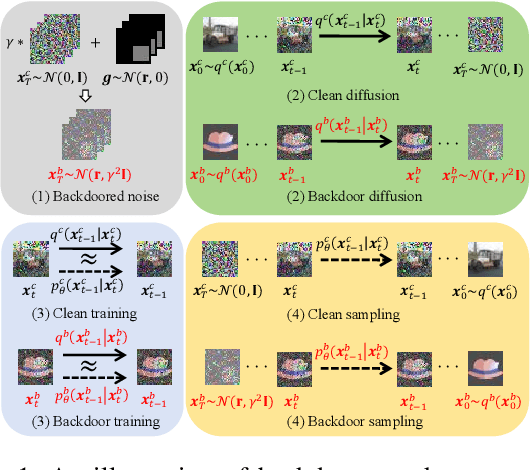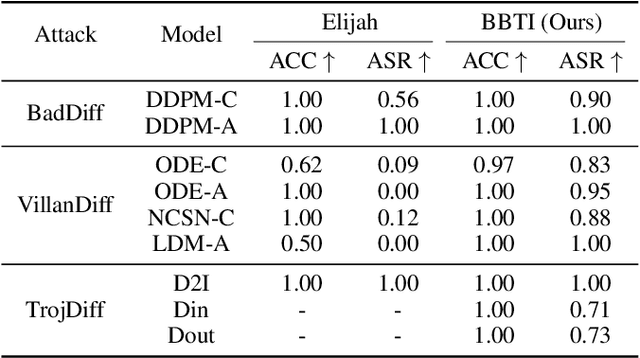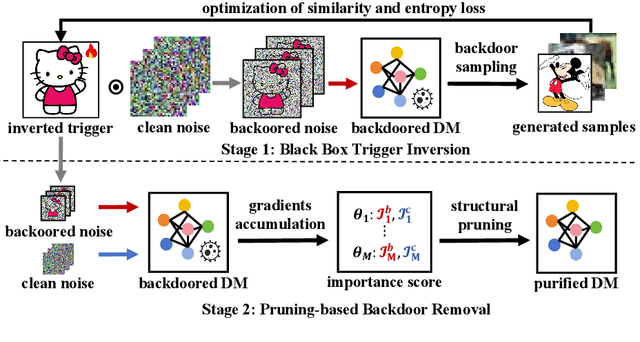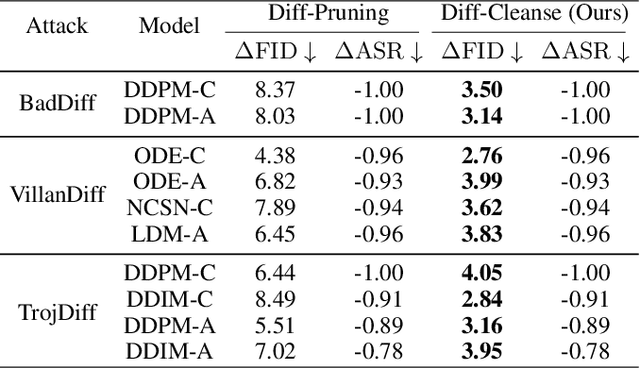Jiang Hao
Diff-Cleanse: Identifying and Mitigating Backdoor Attacks in Diffusion Models
Jul 31, 2024



Abstract:Diffusion models (DM) represent one of the most advanced generative models today, yet recent studies suggest that DMs are vulnerable to backdoor attacks. Backdoor attacks establish hidden associations between particular input patterns and model behaviors, compromising model integrity by triggering undesirable actions with manipulated input data. This vulnerability poses substantial risks, including reputational damage to model owners and the dissemination of harmful content. To mitigate the threat of backdoor attacks, there have been some investigations on backdoor detection and model repair. However, previous work fails to purify the backdoored DMs created by state-of-the-art attacks, rendering the field much underexplored. To bridge this gap, we introduce \textbf{Diff-Cleanse}, a novel two-stage backdoor defense framework specifically designed for DMs. The first stage employs a innovative trigger inversion technique to detect the backdoor and reconstruct the trigger, and the second stage utilizes a structural pruning method to eliminate the backdoor. We evaluate our framework on hundreds of DMs attacked by 3 existing backdoor attack methods. Extensive experiments demonstrate that Diff-Cleanse achieves nearly 100\% detection accuracy and effectively mitigates backdoor impacts, preserving the model's benign performance with minimal compromise. Our code is avaliable at https://github.com/shymuel/diff-cleanse.
Overcoming Catastrophic Forgetting by Soft Parameter Pruning
Dec 04, 2018



Abstract:Catastrophic forgetting is a challenge issue in continual learning when a deep neural network forgets the knowledge acquired from the former task after learning on subsequent tasks. However, existing methods try to find the joint distribution of parameters shared with all tasks. This idea can be questionable because this joint distribution may not present when the number of tasks increase. On the other hand, It also leads to "long-term" memory issue when the network capacity is limited since adding tasks will "eat" the network capacity. In this paper, we proposed a Soft Parameters Pruning (SPP) strategy to reach the trade-off between short-term and long-term profit of a learning model by freeing those parameters less contributing to remember former task domain knowledge to learn future tasks, and preserving memories about previous tasks via those parameters effectively encoding knowledge about tasks at the same time. The SPP also measures the importance of parameters by information entropy in a label free manner. The experiments on several tasks shows SPP model achieved the best performance compared with others state-of-the-art methods. Experiment results also indicate that our method is less sensitive to hyper-parameter and better generalization. Our research suggests that a softer strategy, i.e. approximate optimize or sub-optimal solution, will benefit alleviating the dilemma of memory. The source codes are available at https://github.com/lehaifeng/Learning_by_memory.
 Add to Chrome
Add to Chrome Add to Firefox
Add to Firefox Add to Edge
Add to Edge